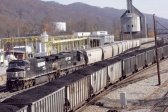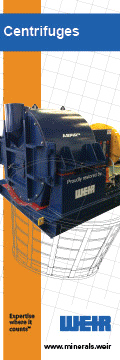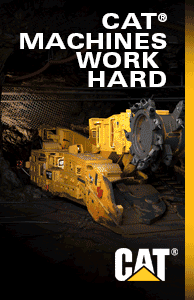Trump’s Proposal About U.S.-Made Steel Pipelines Could Increase Metallurgical Coal Demand

Loaded coal cars roll through the Norfolk Southern Rail Yard in Bluefield. (photo: Eric DiNovo)
[Click image to enlarge]
More coal has been shipped through Bluefield recently because of an uptick in the export of metallurgical coal to Europe, but a local coal expert says the real shift in production could be seen next year.
Rick Taylor, president of the Pocahontas Coal Association, said the cost and demand for metallurgical coal, which is used in the steel-making process, increased temporarily recently.
“There has been an increase going to the peers (in Norfolk),” he said, explaining that European countries were stocking up some after China cut back on production. “It’s not a huge amount, but there has been an increase.”
Taylor said China started importing from Australia, which then cut back on its exports to Europe, causing the spike in the demand for U.S. coal.
“It (the demand) has kind of fallen down lately,” he said. “It has always fluctuated.”
Most of that extra coal probably came from Kentucky, he said, but none locally.
However, Taylor said the domestic market for metallurgical coal could see a dramatic change by next year, depending on Pres. Donald Trump’s plans.
“With what Trump has proposed in terms of some of construction,” the domestic demand for the coal could rise, he said. “He’s saying he will use U.S.-made steel.”
That construction includes pipelines that Trump supports as well as infrastructure projects, which is also on the President’s list of priorities.
“We see an uptick coming in the future,” Taylor said. “It will take him (Trump) awhile to get his budget through. We expect next year to see some increases in the domestic demand.”
Taylor said that is “the kind of hope we have, that is what we are hanging our hats on.”
Several oil and natural gas pipelines are planned around the country, including the Mountain Valley Pipeline (MVP), which would transport natural gas from fracking operations in West Virginia to Chatham, Va., passing through Monroe County, W.Va. and Giles County, Va.
The MVP has not yet received final approval from the Federal Energy Regulatory Commission (FERC).
Trump has also included on his agenda infrastructure upgrades in transportation around the country.
If all of the contractors are required to use steel made in the United States, domestic metallurgical coal would be used to make that steel, Taylor said.
Trump has also started the process of cutting back on what he has called “overreaching” federal environmental regulations that he said have hurt the coal industry.
In a speech in Charleston during the campaign last year, he said that under his administration coal miners would return to work.
With the gradual decline in the industry, local economies have been hit hard, Taylor said, so any uptick would help.
“I don’t think we will ever see it like it used to be,” he said, but any increase in production will help.
“We are optimistic that our domestic coal sales to domestic steel-making mills will go up.”
Taylor said he is not sure if more miners have been called back to work because of the recent spike in exports because those statistics (the number of jobs in the mining industry) are kept, but not immediately released.
“Some jobs may have come back (related to the exports),” he said. “But not in our immediate area.”
Gordon Lambert, McDowell County, W.Va. Commission president, said some coal jobs in the county are coming back, though.
“They are supposed to be opening some mines at Maybeury,” he said, adding that it’s a combination of the increase in the price of metallurgical coal and the optimism associated with the current political climate.
“People are thinking positively about the future now and what President Trumps is talking about,” he said. “When people think that way, they start to invest and start doing things.”
Lambert said the county has been hit hard, down $600,000 last year in the coal severance tax (a 5 percent state tax on coal produced with 75 percent of the collections gong to the county where the coal was extracted).
“We don’t yet know exactly how much we’ll get this year,” he said. “Last quarter, we were down $100,000 from last year, but we are hoping that will climb back up (with increased mining activity).”
Lambert said even with new mines opening, it’s usually at least six months before the county sees any revenue from the coal severance tax.
“But it has to benefit us,” he said.
Source: (March 19, 2017) Bluefield Daily Telegraph
Be in-the-know when you’re on-the-go!
FREE eNews delivery service to your email twice-weekly. With a focus on lead-driven news, our news service will help you develop new business contacts on an on-going basis.
CLICK HERE to register your email address.





















